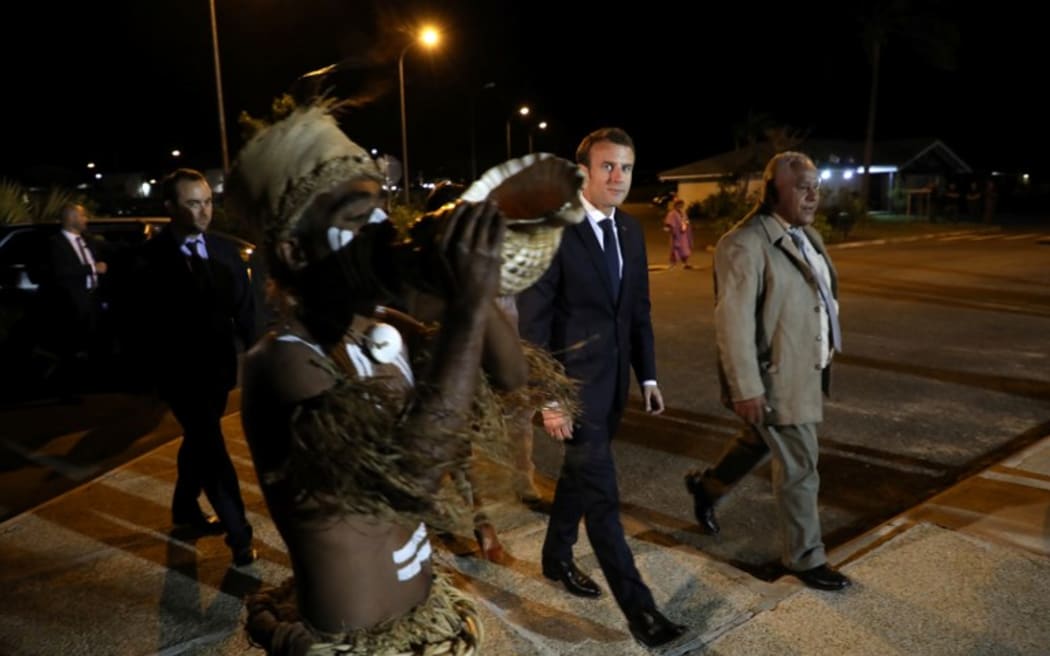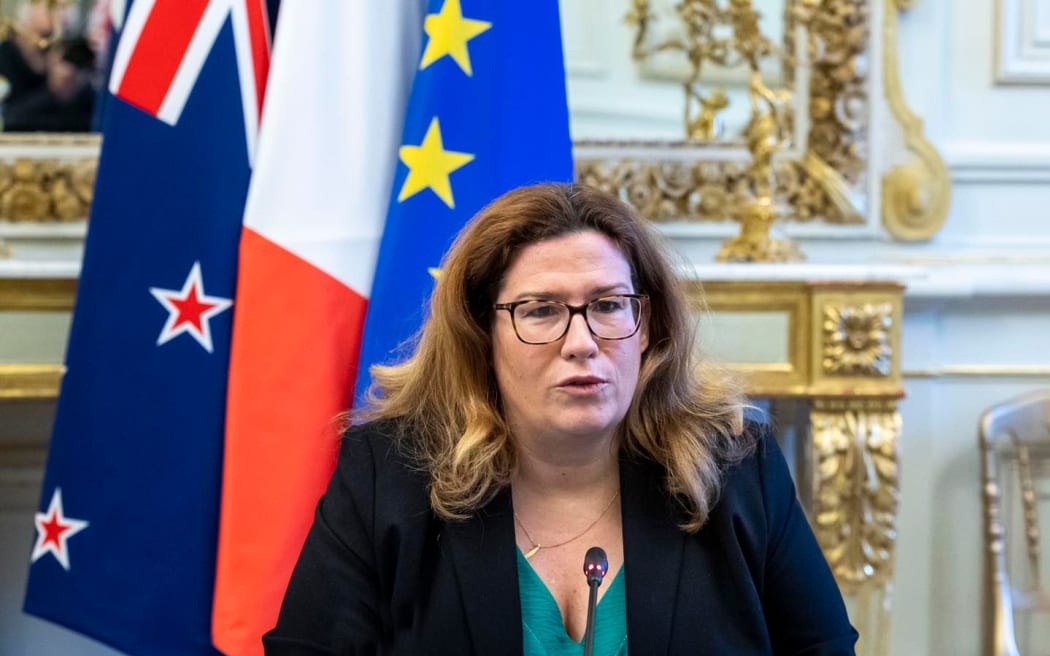By Walter Zweifel
France has been warned against attempts to abandon the New Caledonian decolonisation process pursued for more than two decades.
A veteran independence campaigner, Victor Tutugoro, made the warning on the 25th anniversary of the signing of the Noumea Accord, which has been the roadmap guiding the gradual and irreversible transfer of power from France to New Caledonia.
As one of the signatories, Tutugoro told the news site Outremers360 that “the process of decolonisation must continue. It was thought to bring back calm and serenity, it should not be thrown away today”.
“Rewriting a blank page, wiping everything off the table is dangerous, it’s leading the country to disaster,” he said.
After the violence in the 1980s, the accord between the pro- and anti-independence parties as well as the French state firmed up the consensus for a peaceful approach to the Kanaks’ claim for self-determination.
The proposed 20-year emancipation process of the accord concluded with three referendums between 2018 and 2021 and resulted in three rejections of full sovereignty — two of them very narrowly.
Not legitimate
However, the third and last vote in 2021 is not being accepted by the Kanaks as the legitimate outcome of the decolonisation process.
With the Kanak population being hit hard by the covid-19 pandemic, the pro-independence parties lobbied France to postpone the plebiscite but Paris refused, which prompted a boycott of the vote.
More than 96 percent voted against independence but less than half of the electorate voted.
Few Kanaks voted and as the president of New Caledonia’s Congress and signatory to the Noumea Accord, Roch Wamtyan, noted, the vote missed the point because it should have been about the Kanak people, colonised since 1853.
“It’s a travesty. It’s not a referendum that concerns the Kanak people,” he said.
The anti-independence parties hailed the referendum victory and French President Emmanuel Macron also welcomed the result, saying “France was more beautiful because New Caledonia decided to remain part of it”.
Macron said a new common project had to be built while recognising and respecting the dignity of everyone.
The accord stipulates that in the case of three “no” votes, the political partners would meet to examine the situation which had arisen.
Murky way forward
The way forward is murky as the two sides hold incompatible positions.
There is disagreement over whether the process has come to its conclusion and there is disagreement over whether the Noumea Accord provisions now enshrined in the French constitution are irreversible.

As Noumea law professor Mathias Chauchat noted last year, “there is a contradiction between the lapsing and irreversibility of the Noumea Accord. The two concepts cannot be made to coexist”.
“Either the accord is void or it is irreversible,” he added.
Tutugoro said the accord provisions must continue to be implemented.
He said the rebalancing within the territory as outlined in the accord was not complete, citing the Northern Province where he said one cannot do in 30 years what had not been done in more than 100 years.
“It should be the Kanaks, and those to whom we have given the right to decolonisation [other New Caledonian communities] to run the country today. But we are still far from it. Many decisions are made in ministerial circles or in inaccessible settings,” he said.
He went on to say that it was a mistake “to have trusted certain signatories. The accord is what it is today because some did not keep to their word. And here, the word is sacred,” he said.
Will Paris alter the provincial roll?
A contentious issue emanating from the Noumea Accord is the make-up of the roll used in provincial elections, which choose the provincial assemblies that in turn make up the Congress.
At the insistence of the pro-independence parties, it was agreed that in order to be eligible to vote, an individual must be either an indigenous Kanak or a resident since 1998.
This provision was meant to set the parameters for New Caledonian citizenship.
The anti-independence parties said given the referendum outcome, New Caledonia needed to be realigned with France and the restrictions eased.
They said the restricted roll had become untenable and want France to open it for next year’s elections.
About 40,000 French citizens are excluded from provincial elections but can take part in France’s parliamentary and presidential elections.
A leading anti-independence politician and president of New Caledonia’s Southern Province, Sonia Backes, said she would quit her position in the French government if it failed to open up New Caledonia’s electoral rolls.

Citizens have same rights
An organisation of French citizens without full voting rights in New Caledonia pointed out a basic principle of the French republic was that all citizens had the same rights.
Cognisant of the possible implications of the Noumea Accord, the French government noted that “a lasting registration of a restricted and fixed electorate would raise difficulties with regard to France’s international commitments under the International Covenant on Civil and Political Rights and under the European Convention on Human Rights”.
Two months ago, French Interior Minister Gerald Darmanin said the 2024 provincial elections would not be able to go ahead with the 1998.
However, he has yet to announce what change his government plans and how it would be implemented.
The pro-independence parties, united under the FLNKS umbrella, keep objecting to any suggestion for change.
Its delegate at the UN Decolonisation Committee, Dimitri Qenegei, said last year that France’s intention to open up the electoral rolls was the ultimate weapon to “drown” the Kanak people and “recolonise” New Caledonia.
The Kanaks, he said, would be made to disappear and that would not be accepted, inevitably lead to conflict.
‘Mother of all battles’
The Caledonian Union’s Gilbert Tyuienon told New Caledonia’s La Premiere television at the weekend that getting the restricted roll was “the mother of all battles” for the Kanaks in the process of attaining the 1998 Noumea Accord.
Last month, the union’s president, Daniel Goa, warned that if France changed the roll for provincial elections, there would be a risk of there never being any election.
He added that the survival of the Kanaks hinged on the issue.
In response, the anti-independence coalition, led by Backes, lodged a complaint with the French prosecutor for alleged incitement to violence and sedition.
In defending Goa, Tyuienon said he simply stated what the party membership thought.
He warned that dialogue [with France] would be suspended if Goa was taken to court.
Since the disputed 2021 referendum, the Caledonian Union keeps insisting that any discussion has to be a bilateral one between the coloniser and the colonised people.
Sovereignty timetable
It insists on a timetable to be presented for the restoration of sovereignty taken in 1853.
Only then, it said, would it be prepared to enter into trilateral talks which included the anti-independence parties.
In the week after the 2021 referendum, Paris presented a timetable for the post-referendum process which was meant to culminate in a new referendum on a new statute for the territory in June this year.
The pro-independence parties, however, deprived the French plan of its momentum.
Only last month saw the pro-independence parties accept top level contact with the French government for the first time since the 2021 vote.
There was no tangible progress towards any new statute but agreement to continue talks in June when the French interior minister Darmanin is due back in Noumea for a second time in three months.
The provincial elections are scheduled for May next year, but it is uncertain what the roll will look like.
Walter Zweifel is a RNZ Pacific reporter. This article is republished under a community partnership agreement with RNZ and Asia Pacific Report.

